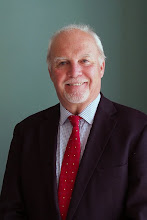Yesterday it was Sarah Williamson, CEO of FCLT Global. Today (Friday 3 January) it’s Mr Dig Howitt, CEO of Cochlear, the Sydney-based company that does those magical hearing implants – they both agree that investment in ongoing innovation is essential and they’re both saying so to The Australian (see p.19 of today’s edition).
Dig Howitt is an interesting study. His company depends entirely on technology and operates from facilities across the globe. It invests about 12% of its revenue each year in R&D – I’ll say that again: 12%. In 2019 this amounted to $180 million.
I’ll repeat that one more time in case you didn't understand what I'm saying: in 2019, Cochlear invested $180 million, or about 12% of its revenue, in self-funded R&D. Any other Australian companies out there matching the scale or effectiveness of this R&D investment?
Although it’s a life sciences firm its technology journey has important lessons for high-technology companies operating in the defence and other adjacent markets. Here’s a selection of what he has to say:
“We see constant innovation as a must. The primary focus of our R&D is investing in improving hearing outcomes. We also invest in integrating our products with everyday lives. Finally, we are investing in building the clinical evidence that shows …the economic and social benefits of treating hearing loss effectively.”
Multiple reviews over the past five years or so agree that Australia’s future prosperity will be driven by knowledge-intensive companies that collaborate, innovate and export, Mr Howitt says. However, he warns that Australia is not competing as actively as peer nations such as the UK and Ireland for R&D investment, advanced manufacturing and life sciences businesses. Reintroducing the RDTI (R&D Tax Incentive) legislation would help, if it passes Australia’s senate. So would a stronger incentives regime for companies doing cutting edge R&D and IP development; and so also would a more flexible regulatory framework that allows local firms to be globally competitive while protecting local consumers.
A couple of thoughts: firstly, Cochlear understands its absolute dependence on technology and the need to invest constantly in refreshing its technology base and IP; secondly, it has a global market with multiple paths to the customer, so it can build its business and generate a return in a realistic time frame. The demand is there, the paths to market exist and so opportunities continue to exist for Cochlear in the global health market.
How does that sit with Australia’s defence industry? Thoughts?


No comments:
Post a Comment